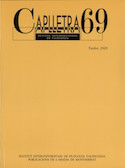What we learn about language from Spoken Corpus Linguistics?
DOI:
https://doi.org/10.7203/caplletra.69.17267Keywords:
Spoken Corpus Linguistics, Speech Mode, Grammar, Italian Abstract
Abstract
Over the last few decades, the Spoken Corpus Linguistics (SCL) has achieved a great deal in terms of quantity and quality of works (O’Keeffe, McCarthy 2010). Enormous progress has been made in the last thirty years and the increment of multimodal corpora stimulates sophisticated investigations on the relationship between the verbal and non-verbal component of spoken communication (Knight 2011). The SCL is a very vital field of research, which is able to provide essential data and tools for the advancement of language knowledge. In this article I will focus on the contribution that SCL and the resulting data provide to general linguistics. In § 2, I discuss the contribution that the SCL gives to a better understanding of linguistic variation; in § 3, I show how the SCL can improve the descriptive adequacy of grammar; finally, § 4 is dedicated to the contribution that speech data can give to a better knowledge of the grammaticality of languages. Across the article I will use mainly data from Italian corpora, but widely validated by comparison with data from corpora of other languages.
 Downloads
Downloads
Downloads
Published
How to Cite
-
Abstract689
-
PDF400
Issue
Section
License
Authors submitting work to Caplletra for publication must be the legitimate holder of the usage rights. Legitimacy for the purposes of publishing the work must also include images, tables, diagrams and any other materials that may complement the text, whether they are the author of such material or not.
Copyright: on publishing their work in the journal, the author grants Caplletra. Revista Internacional de Filologia usage rights (reproduction, distribution and public communication) for both the paper printed version and for the electronic version.
All work published in Caplletra is covered by the Creative Commons license type Attribution-NonCommercial-NoDerivatives 4.0 (CC BY-NC-ND 4.0).
RESPONSABILITY
Caplletra. Revista Internacional de Filologia does not necessarily identify with the points of view expressed in the papers it publishes.
Caplletra. Revista Internacional de Filologia accepts no responsibility whatsoever for any eventual infringement of intellectual property rights on the part of authors.






